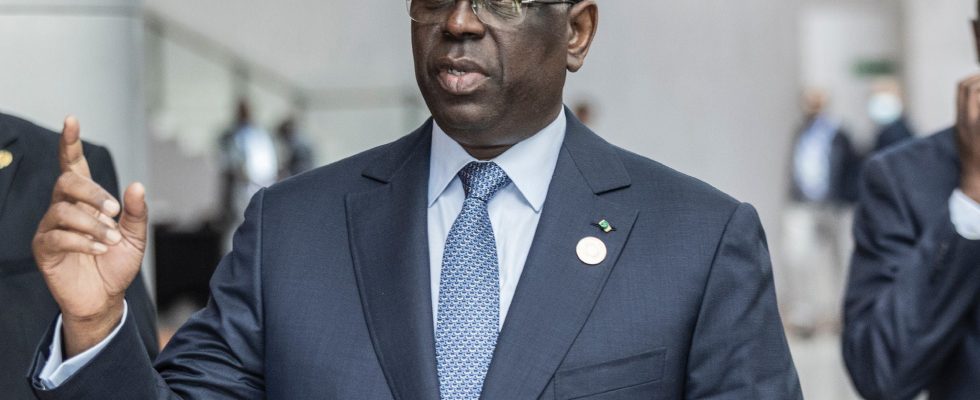Traditional island of stability in West Africa, Senegal in turn finds itself in a zone of turbulence. The decision of President Macky Sall on Saturday to postpone indefinitely the presidential election scheduled for February 25 led to a sudden rise in tension in the country and the first clashes on Sunday. If the Senegalese head of state justified his decision by a conflict between the Constitutional Council and the National Assembly after the validation of the candidates in the ballot, the opposition immediately accused him of a “constitutional coup d’état”. “Behind the legal quibbles put forward by those in power to justify the postponement of the election, there is in reality a major political crisis in the country,” underlines the journalist specializing in Africa Antoine Glaser, author, with his colleague Pascal Airault, from the book Macron’s African Trap (Fayard, 2021).
L’Express: After Sunday’s clashes, should we fear further unrest in Senegal due to Macky Sall’s decision to postpone the presidential election indefinitely?
Antoine Glaser: There is indeed a risk of further unrest. Let us remember that there had already been extremely violent demonstrations in Senegal, with several deaths, in March 2021 then in June 2023. Behind the legal quibbles put forward by those in power to justify the postponement of the election, there is in reality a major political crisis in the country. It pits a traditional political class, embodied by the president, Macky Sall, against an opposition of which Ousmane Sonko is the main figure, and who did not have the right to run in the presidential election despite the support of the youth. It is a regime crisis like we have seen elsewhere in West Africa and which has manifested itself in coups d’état in Mali, Burkina Faso and Niger.
How can we explain this postponement of the election?
The president, Macky Sall, has long wondered whether he was going to run for a third term. But he ultimately gave up, preferring to give way to a candidate from his camp, the current Prime Minister, Amadou Bâ. However, the latter is in a bad position in the polls and could lose the election in the second round against Bassirou Diomaye Faye, who is the candidate supported by opponent Ousmane Sonko.
As a reminder, Ousmane Sonko published a work in 2018 entitled “Oil and gas in Senegal, chronicle of dispossession”, in which he accused the president and his entourage of embezzlement. There has been personal animosity between them ever since. Knowing that a candidate close to Ousmane Sonko could participate in the election, and possibly win it, provoked this extremely violent reaction from the president, Macky Sall. It is also unbearable for him to see that this same candidate is supported by young people who want to overturn the table and sweep away a traditional political class accused of being corrupt.
Are we observing today an authoritarian drift from Macky Sall?
Yes. Contrary to what his style, at first glance rather good-natured, suggests, Macky Sall is tough. He has largely used justice against his opponents, such as Ousmane Sonko and members of his party, or the former mayor of Dakar, Khalifa Sall, also a candidate in the presidential election. Macky Sall also did not hesitate to bring the gendarmes into the streets, who are the real spearhead of the regime, more than the army, to firmly repress the demonstrations.
Senegal was considered an island of stability in West Africa. Does this postponement of the vote mark the end of this situation?
We see that Senegal also leaves the traditional democratic framework. The extremely violent demonstrations in 2021 and 2023 were a first step, but the postponement of this presidential election, combined with the fact that many opposition candidates are in prison, marks a new milestone. And this also increases anti-French sentiment, since France is accused of supporting Macky Sall. In this regard, French diplomacy undoubtedly did well to let the United States react first, by regretting the postponement of the elections, before doing so in turn. Everything that comes from France today is extremely poorly received by African youth.
Are this postponement of the election and the ensuing unrest a new blow for France?
Absolutely. In my opinion, we are witnessing the beginning of a new historical period. Between the independence of the 1960s and the fall of the Soviet Union in 1991, there was a postcolonial period during which West Africa continued to be a form of French backyard, where few changes have been undertaken on the political, institutional or financial levels. But following this period, France’s influence on the continent gradually diminished.
Thus, when the jihadist crisis in the Sahel intensified in the region in 2013 and Paris launched Operation Serval, then Barkhane in 2015, the French presence was already in decline. Today, the African continent is becoming globalized with the strengthening of powers such as China, Russia, the United States, and Turkey. The systems inherited from independence are now undergoing profound transformation, and this is accompanied by a very clear loss of influence for France on the continent.
.
